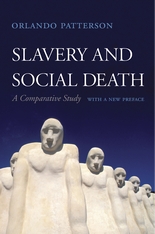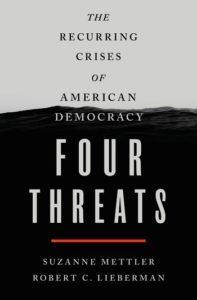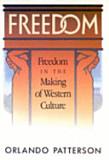America is the only modern nation that had slavery in its midst from the very beginning. The institution and its neo-slavery successor, Jim Crow, played a formative role in the county’s social, economic, ideological and cultural development, especially in how it came to define freedom and citizenship, says Orlando Patterson (above), the John Cowles Professor of Sociology at Harvard University.
 As the eminent Yale historian Edmund Morgan demonstrated, America’s passion for freedom emerged in some substantial measure from the bosom of Virginian slavery. It is no accident that so many of the nation’s revolutionary leaders and Founding Fathers were Virginians, he writes in The Long Reach of Racism in the U.S., The Wall Street Journal’s Saturday Essay:
As the eminent Yale historian Edmund Morgan demonstrated, America’s passion for freedom emerged in some substantial measure from the bosom of Virginian slavery. It is no accident that so many of the nation’s revolutionary leaders and Founding Fathers were Virginians, he writes in The Long Reach of Racism in the U.S., The Wall Street Journal’s Saturday Essay:
As in the slave system of ancient Athens, the American idea of freedom sprung from the cauldron of slavery in a seemingly contradictory way. It meant, on the one hand, liberation from tyranny, celebrated in the Declaration of Independence and the modern world’s first Bill of Rights, which were drawn from the philosophy of John Locke and English constitutional tradition. At the same time, however, freedom was defined by the power to dominate and degrade others.
To be black is to be forced to overcome implicit and explicit reactions to the color of your skin, the Hoover Institution’s Condoleezza Rice adds. “The good news is that these responses can be overcome with the respect that builds when people know one another as human beings,” she writes for The Post.
U.S. democracy is “being tested as never before in the memory of most living Americans,” according to the National Endowment for Democracy (NED). Injustices that are deeply rooted in history and society are hard to eradicate, here at home as well as abroad, it said in a statement:
The struggle for justice is continuous, and it is our hope that the outrage unleashed by the killings of George Floyd, Ahmaud Arbery, Breonna Taylor, and others on too long a list, will generate new political will, across our partisan divides, to reform and improve our democracy. Such a movement is needed not just for the sake of our own country, but for the benefit of brave people on the frontlines of democratic struggles around the world who share our commitment to human freedom and equality under the rule of law.
 But what makes this moment of national unrest especially significant, in a country with a long history of racial division, is that racism has become a threat to our democracy, according to scholars such as Suzanne Mettler, a professor of government at Cornell University, PRI reports:
But what makes this moment of national unrest especially significant, in a country with a long history of racial division, is that racism has become a threat to our democracy, according to scholars such as Suzanne Mettler, a professor of government at Cornell University, PRI reports:
It has “been like this underground stream through all of American history. It’s always there, kind of waiting to be tapped, and sometimes it comes to the surface more than others,” said Mettler, the co-author with Robert Lieberman of Four Threats: The Recurring Crises of American Democracy, which identified four issues that have historically undermined American democracy. For the first time in US history, all four factors: expansive presidential power, political polarization, rising economic inequality and racism or nativism, are at play at the same time, the authors claim.
 Between the horrifying supremacist throttling of George Floyd and the noble rage of young Americans against such historic evil, we see the two contrasting visions that have defined America, adds Petterson, the author of many books including “Slavery and Social Death,” “Freedom in the Making of Western Culture” and “The Ordeal of Integration”:
Between the horrifying supremacist throttling of George Floyd and the noble rage of young Americans against such historic evil, we see the two contrasting visions that have defined America, adds Petterson, the author of many books including “Slavery and Social Death,” “Freedom in the Making of Western Culture” and “The Ordeal of Integration”:
The former is now terrifyingly assertive after long being dismissed socially and politically and condemned to the fringes of civilized life; the foundational institutions and norms of the latter, liberal-constitutional tradition currently face their gravest assault in the modern history of the nation. It is hard to believe that the better angels of America will not prevail. But, in these times, it is naive not to be deeply worried. RTWT







